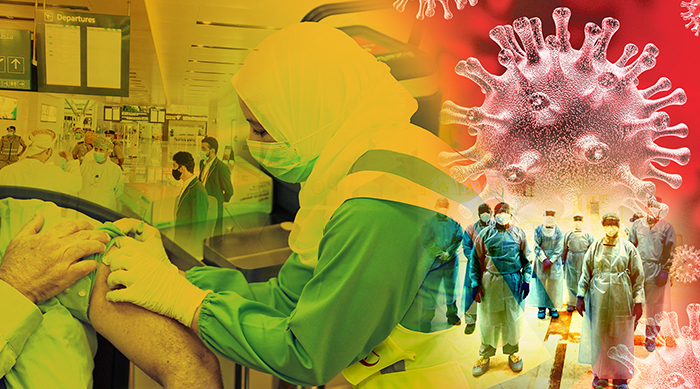

Muscat: Setting up a fund to support Oman’s health services, providing free COVID treatment to Omanis and expatriates in the country, organising a hotline for people to report cases of infection, and bringing home Omani nationals stranded overseas are some of the efforts of the government that have been praised by the Oman Human Rights Commission (OHRC) in its handling of the COVID-19 pandemic.
The commission also personally intervened in 70 instances of people who required emergency assistance in 2020, owing to the pandemic. These were related to providing help in the form of housing, family support, resolving labour disputes, child welfare, urgent healthcare, and many others.
The OHRC, in its annual report, also saw the formation of the Supreme Committee to deal with COVID-19, and the pardoning of foreign prisoners so that they could return to their home countries during the pandemic.
Reserving special praise for His Majesty Sultan Haitham Bin Tarik, the commission said, “The establishment of the fund came as an important initiative to support the steps taken by the government and the Central Bank of Oman in this field. His Majesty the Sultan donated OMR10 million to the fund, which also receives donations from institutions and individuals.
The Royal Orders of His Majesty to curb the spread of the pandemic, achieve social solidarity, and maintain the health of individuals and society, were also appreciated.
A number of initiatives carried out by the Supreme Committee in the form of regular COVID tests and running awareness campaigns in multiple languages to inform both Omanis and foreign nationals about taking care of their health during the pandemic to avoid contracting the virus, and spreading it to others, were greeted positively.
“The Sultanate was able to contain this pandemic and reduce its negative effects, thanks to the efforts taken by its government, civil and military stakeholders, steps and procedures that were followed, and the cooperation and awareness of citizens and residents in various governorates and wilayats,” said the OHRC.
“The Sultanate’s government has assured residents, and those whose short-term visas had expired, that no fines would be imposed, and that no legal action taken will be taken against this category of individuals,” the organisation went on to say.
“The Sultanate’s government has been keen to provide all the needed medical supplies to deal with the virus, treat infections, intensify preventive measures, and import the necessary medical materials through flights.
“It has also provided strategic stocks of food and consumer goods in the various governorates and wilayats in the Sultanate,” the report added.
“The Omani government has also provided various facilities for the private sector to import food and provide necessary storage places for them.”
Appreciation was also directed towards the Ministry of Health, which is the government body bearing the brunt of the responsibility of Oman’s COVID response, in terms of treatment of patients, devising procedures to keep the virus at bay, research on infection patterns in the country, and coordination with international partners to procure vaccines for Oman’s people.
“The Supreme Committee, represented by the Ministry of Health, endeavoured to ensure the maintenance of the effectiveness of health systems in the Sultanate by launching virtual clinics to ensure the continuity of providing healthcare to patients remotely,” explained the OHRC. “Non-urgent operations have also been scheduled for patients as a precaution.
“Health authorities continued to perform necessary and urgent surgeries for patients with critical conditions,” they added. “Preventive measures were intensified for such categories of patients. The Ministry of Health launched a hotline to receive inquiries from pregnant women, and breastfeeding mothers to provide them with clinical advice in case their condition does not need them to visit health institutions during the pandemic.”
During the pandemic, the Ministry of Health also ran an expanded vaccinations programme in the Sultanate. According to the latest World Health Organization (WHO) statistics, the Sultanate has achieved a score of more than 99 percent in the comprehensive assessment of vaccine management.
Efforts in dealing with the pandemic, the organisation noted, led to Dr Ahmed bin Mohammed Al Saidi, the Minister of Health, being named to the membership of the WHO Executive Council, and appointed the first vice president for its current term.
Another initiative that was met with praise was the use of technology to track the spread of COVID and the treatment efforts rolled out by the government, namely the Tarassud+ app, which was launched soon after the pandemic began, and has been downloaded by tens of thousands of people.
It has “enhanced features that include up-to-date COVID-19 statistics, guidelines and best practices to prevent the spread of infection. The application also enables access to medical hotlines and support staff so that patients can discuss their symptoms and be directed to facilities where they can access care. Once patients are diagnosed, a medical tracking bracelet connected to the application ensures that they stay at home for the duration of their quarantine or isolation.”
The Oman Human Rights Commission also singled out the Central Bank of Oman (CBO) for its measures allowing borrowers to defer their loan repayments, in order to reduce the economic impact faced by them during the pandemic.
“The CBO has also issued a number of directives to all licenced banks and financing companies operating in the Sultanate to take into account the conditions of borrowers,” said the organisation. “CBO has also pumped additional liquidity, about OMR 8 billion, to meet these emergency economic conditions.”